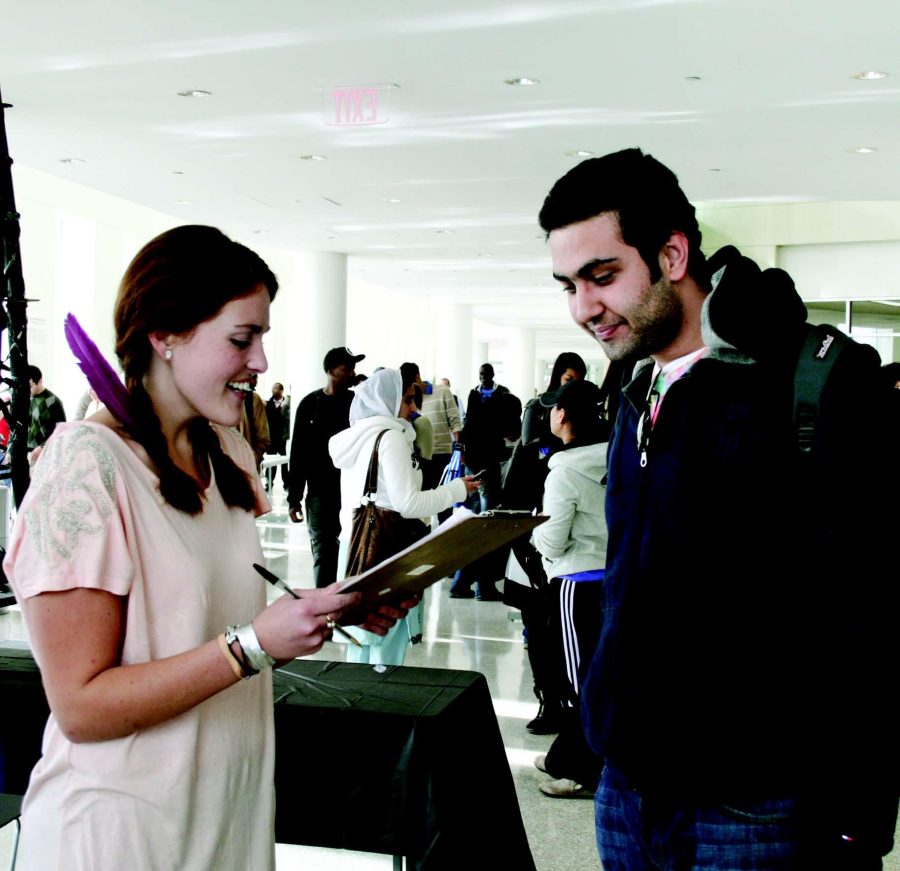UMass Boston’s political science honor society Pi Sigma Alpha and MASSPIRG hosted “November’s Bal- lot Questions: How They Will Affect UMass Students.” The event featured professors Catherine Lynde and Caroline Coscia as well as John Mc- Gahan, director of substance abuse agency Gavin Foundation, Inc.McGahan discussed the first ballotquestion, which is an attempt to repeal the 6.25 per-cent sales tax on alcohol products that was approved in a revious ballot question. He believes that “alcohol does not deserve a special exemption.” McGahan said that Massachusetts has one of the highest rates of alcohol, and substance abuse in the nation, and explained that the reason for this tax is to fund substance abuse education and treatment. He also believes that “the higher the cost of alcohol, the less number of teenagers will be drinking.” According to McGahan, this question was promoted by liquor whole salers. He explained that the Committee Against Repeal of the Alcohol Tax has a 10-point lead, “but alcohol wholesalers have hired a firm for a $350,000 campaign, all out of greed— this is not a mom-and-pop thing.” He briefly addressed the position of those who think this tax should be repealed and believe it is double taxation, which he said “is not true.” McGahan told the crowd that the funds from this alcohol tax go into a trust fund used for substance abuse treatment and education, which costs residential facilities $75 a day, as op- posed to “$600 a day for incarceration.” McGahan continued, “We are tempted to think how it affects [the] pocketbook. But we can’t [throw] these people out—it affects the famiies around us” Lynde gave a presentation on the effects of ballot question three, an at- tempt to lower the sales tax to 3 per- cent. Certain items like clothing, food and medication are exempt from tax- es, but others are taxed at a different rate. “To drop sales taxes down–in particular for alcohol–will cost $2.5 billion in tax revenues,” she stated. During her presentation, Lynde made a distinction between obligatory spending, like Medicare, and discretionary spending, like intra-mural sports and music programs. She showed the way that spending for public schools, including colleges, has gone down significantly from 2000 to 2010. According to Lynde, this is because politicians believe that schools can raise fees. “This tax de-crease would result in more crowded class-rooms, increased fees and high- er property taxes,” she concluded. Coscia discussed question two, which is an attempt to modify Chap- ter 40B building permits for low-in- come housing developments. Speak- ing from her experience serving on the Wakefield Planning Board, she explained her position is that low- income housing is more complicated than a yes or no question. Coscia explained that the ballot question addresses articles 20-21 of Chapter 40B of Massachusetts law. These articles were passed in 1969 as a response to the influx of minori- ties and low-income individuals who moved into Boston. “This referendum question was proposed by a single person in Arlington,” she explained. The reason that Chapter 40B hous- ing is preferred by contractors is that, by classifying approximately 20-25 percent of their housing develop- ments as low-income housing, they can save time by making their pro- posals to one zoning board which “gives control to the developer,” she explained. Although required by law that these housing contracts are only supposed to give a contractor a 20 percent prof- it margin, contractors often side-step this part of the law. Coscia explained that this was referred to as the “An- ti-snob zoning law” and that it was “muscled through the house,” forcing Governor Francis Sargent, a liberal Republican, to sign the bill. She also explained that the wording of Ques- tion Two is “purposely confusing.” All three panelists urged students and voters to vote no on all three bal- lot questions. However, every student should read the proposals and make their own decisions before heading to the voting booths.
Latest Stories
- Environmental leaders spark change at the Community Action Works Summit
- Massachusetts partners with local nonprofit to support Summer Eats program
- Day Three: Chappell Roan, Hozier, and The Killers bring Boston Calling to a Spectacular Finish
- Boston Calling Day Two: Jessie Murph, The Red Clay Strays, and Tyler Childers Light Up the Stage
- Boston Calling Day One: Luke Hemmings, David Kushner, Renee Rapp, and Ed Sheeran.
- Semester reflections: A mix of emotions in the journey of higher education
- Celebrate AANHPI Heritage Month with these must-read books
- Liberation through tradition: Passover in a time of genocide
- Karla Corres Luna wins a Fulbright Award
- Get creative with the UMass Boston Art Club
63°





















































